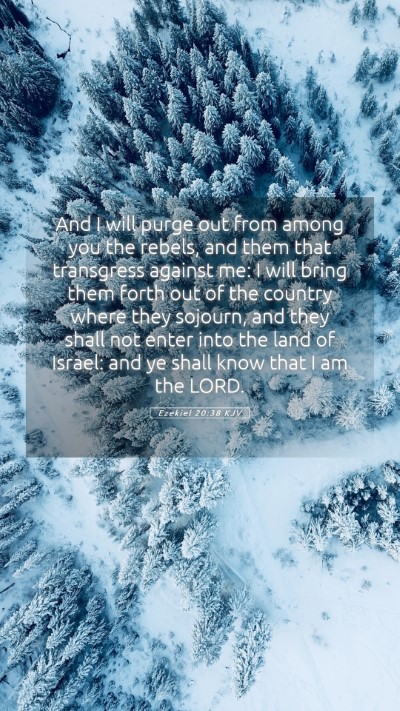Ezekiel 20:38 - Meaning and Interpretation
Ezekiel 20:38 states: "And I will purge out from among you the rebels, and them that transgress against me: I will bring them forth out of the country where they sojourn, and they shall not enter into the land of Israel: and ye shall know that I am the Lord."
Bible Verse Context and Background
This verse is part of a larger discourse in which God, through the prophet Ezekiel, addresses the exiled Israelites. God calls them to remember their historic disobedience and rebellion, emphasizing the necessity of cleansing His people before restoring them. Understanding this context is essential for biblical exegesis and interpretation.
Summary of Insights
-
Divine Judgment:
The verse highlights God's intention to purge the rebels from among His people. This judgment serves as a reminder that disobedience has consequences and that God holds His people accountable.
-
Restoration of Relationship:
By separating the righteous from the unrighteous, God prepares the way for restoring the covenant relationship with Israel. This purification process is vital for genuine repentance and returning to God's favor.
-
Identity of God:
The conclusion of the verse emphasizes that the Israelites will know God as their Lord through these actions, reinforcing His sovereign authority and the importance of recognizing Him as their God.
Detailed Commentary
According to Matthew Henry, this passage reveals the necessity of divine purging among God's people. He reflects on the need for God to rid His community of rebellion, drawing attention to His holiness. Henry emphasizes that God does not tolerate persistent sin and rebellion and that He will act decisively to remove those who oppose His will.
Albert Barnes elaborates on the significance of God's judgment, explaining that God's purging action is not arbitrary but based on His justice. This thorough sifting of people reflects God's desire for a holy community that embodies His covenant. Barnes underscores the importance of understanding God's righteousness in the context of divine dealings with Israel.
Adam Clarke adds detailed historical insights, noting that this purging foreshadows a greater spiritual reality, where God ultimately judges sin. Clarke points out that the fulfillment of this verse spans both the immediate context of Babylonian exile and a broader eschatological promise, where God's final judgment will discern the faithful from the unfaithful.
Applying Ezekiel 20:38 to Today
For modern readers seeking Bible study insights, this verse encourages personal reflection on one's spiritual condition. Engaging with the themes of rebellion and purification invites us to consider the areas in life where we resist God's authority. Understanding this scripture fosters growth, allowing believers to seek genuine repentance and alignment with God's will.
In Bible study groups, discussing this passage can lead to meaningful conversations about accountability, community standards, and God's unwavering desire for holiness. It can serve as a profound lesson on the importance of confession and the transformation that follows true repentance.
Related Cross References
- Jeremiah 15:2 - Discusses God's judgment and the fate of the rebellious.
- Ezekiel 18:30 - Calls for repentance and the promise of forgiveness.
- Hebrews 10:26-27 - Warns about deliberate sin after receiving the knowledge of truth.


